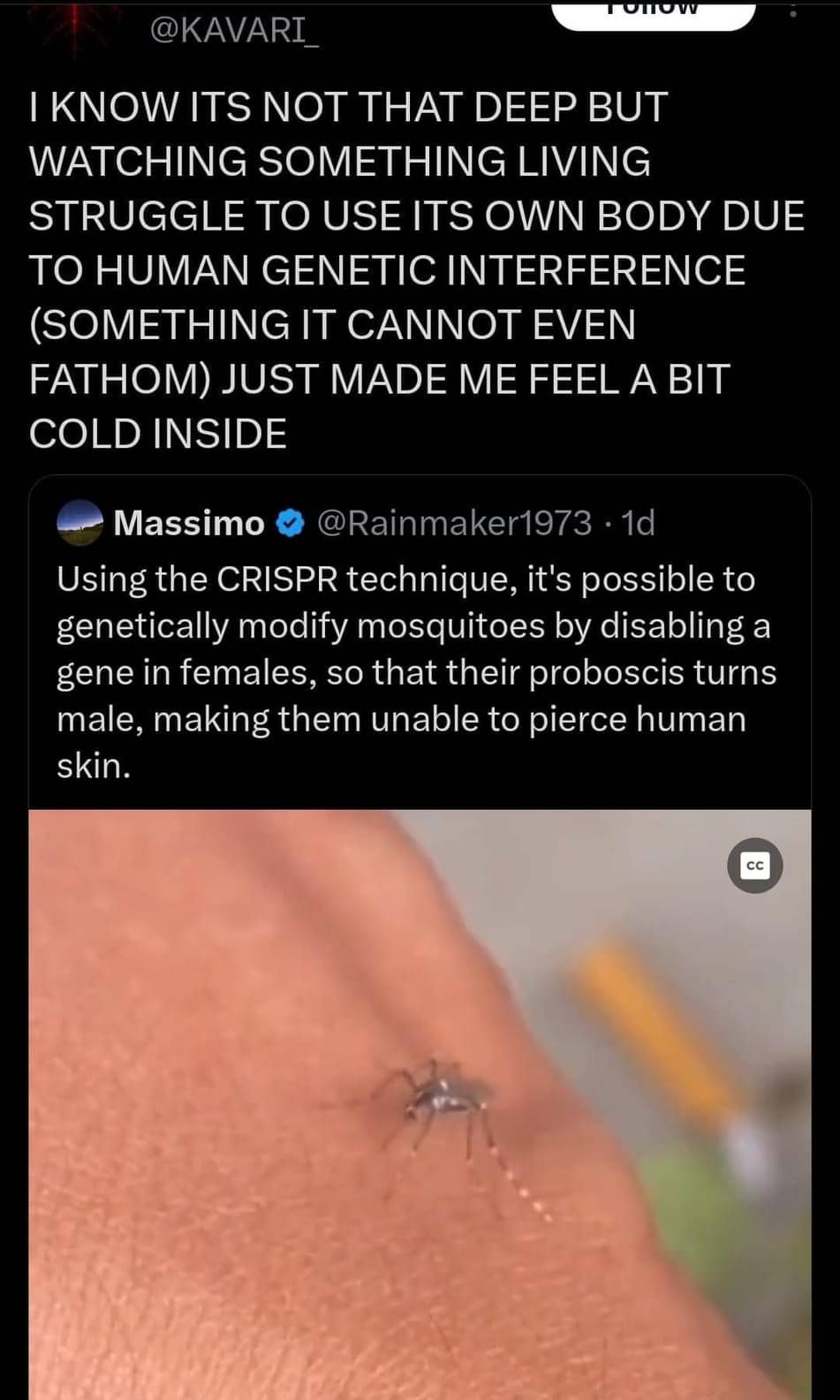this post was submitted on 14 Oct 2024
747 points (96.9% liked)
Science Memes
11399 readers
1179 users here now
Welcome to c/science_memes @ Mander.xyz!
A place for majestic STEMLORD peacocking, as well as memes about the realities of working in a lab.

Rules
- Don't throw mud. Behave like an intellectual and remember the human.
- Keep it rooted (on topic).
- No spam.
- Infographics welcome, get schooled.
This is a science community. We use the Dawkins definition of meme.
Research Committee
Other Mander Communities
Science and Research
Biology and Life Sciences
- !abiogenesis@mander.xyz
- !animal-behavior@mander.xyz
- !anthropology@mander.xyz
- !arachnology@mander.xyz
- !balconygardening@slrpnk.net
- !biodiversity@mander.xyz
- !biology@mander.xyz
- !biophysics@mander.xyz
- !botany@mander.xyz
- !ecology@mander.xyz
- !entomology@mander.xyz
- !fermentation@mander.xyz
- !herpetology@mander.xyz
- !houseplants@mander.xyz
- !medicine@mander.xyz
- !microscopy@mander.xyz
- !mycology@mander.xyz
- !nudibranchs@mander.xyz
- !nutrition@mander.xyz
- !palaeoecology@mander.xyz
- !palaeontology@mander.xyz
- !photosynthesis@mander.xyz
- !plantid@mander.xyz
- !plants@mander.xyz
- !reptiles and amphibians@mander.xyz
Physical Sciences
- !astronomy@mander.xyz
- !chemistry@mander.xyz
- !earthscience@mander.xyz
- !geography@mander.xyz
- !geospatial@mander.xyz
- !nuclear@mander.xyz
- !physics@mander.xyz
- !quantum-computing@mander.xyz
- !spectroscopy@mander.xyz
Humanities and Social Sciences
Practical and Applied Sciences
- !exercise-and sports-science@mander.xyz
- !gardening@mander.xyz
- !self sufficiency@mander.xyz
- !soilscience@slrpnk.net
- !terrariums@mander.xyz
- !timelapse@mander.xyz
Memes
Miscellaneous
founded 2 years ago
MODERATORS
you are viewing a single comment's thread
view the rest of the comments
view the rest of the comments

Why not just eradicate them? Genuine question. I don't think they serve any purpose in nature and are just pissing off every living being.
They absolutely serve purpose in nature, they are a significant food source for bats and many other insects and males are pollinators.
Putting aside questions of ecosystems etc, I think the main reason is that we just can't - ironic since we seem to be extint-ing all the other animals
In South America they tried in the 50s and 60s, and more kept cropping up. They breed so quickly, if you miss an area they can just rebound. Then more can come in on ships and stuff
So you couldn't really localise it, it would have to be a huge global undertaking. And it would likely require widespread use of pesticides that are at best tricksy and at worst illegal, not to mention environmentally shitty
Most modern plans for eradication involve creating a virus that handles it, rather than a pesticide.
Have the virus introduce a gene that takes a few generations of breeding in the impacted population before it starts to debilitate or sterilize the mosquitoes. That way your virus can start to kill the population even as it spreads to areas that were missed.
Also significant politics within the field preventing integrated approaches to control. It's possible we could target specific species of mosquito that are vectors for deadly disease, with the intent of eradicating the disease by suppressing the vector. It would be the greatest collective undertaking of human kind. We'd have to shelf things like international borders and profits.
We're stuck with being annoyed in any case.
They need blood to procreate so the method in the post does exactly what you are asking for
Well, they actually do have their ecological roles and it is always a hard decision if one should interfere on such a large scale with biological systems. We might think that we understand it, but it could be totally wrong. Really hard to predict. Mosquitoes are an important food source for other animals and are also pollinators.
I read somewhere that spiders & co. don't like them because they have too less nutritional value. Literally flying little bots that want to stab you.
Many species of mosquitos are reliant on blood for reproduction. The females utilize a "blood meal" for the nutrients for laying eggs to be fertilized. Additionally, it is the female mosquito bite that transmits diseases like malaria.
Bats eat mosquitoes so we be killing off bats food supply. So just get bats and solve your mosquitoe problem.